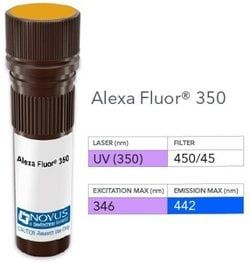MyoD Antibody (MYOD1/2075R), DyLight 755, Novus Biologicals™
Manufacturer: Novus Biologicals
Select a Size
| Pack Size | SKU | Availability | Price |
|---|---|---|---|
| Each of 1 | NB009088-Each-of-1 | In Stock | ₹ 57,494.00 |
NB009088 - Each of 1
In Stock
Quantity
1
Base Price: ₹ 57,494.00
GST (18%): ₹ 10,348.92
Total Price: ₹ 67,842.92
Antigen
MyoD
Classification
Monoclonal
Conjugate
DyLight 755
Formulation
50mM Sodium Borate with 0.05% Sodium Azide
Gene Symbols
MYOD1
Immunogen
Recombinant human full-length MyoD protein (Uniprot: P15172 )
Quantity
0.1 mL
Research Discipline
Cancer, Cell Cycle and Replication, Growth and Development, Phospho Specific
Test Specificity
Recognizes a phospho-protein of 45kDa, identified as MyoD1. This monoclonal antibody does not cross react with myogenin, Myf5, or Myf6. Antibody to MyoD1 labels the nuclei of myoblasts in developing muscle tissues. MyoD1 is not detected in normal adult tissue, but is highly expressed in the tumor cell nuclei of rhabdomyosarcomas. Occasionally nuclear expression of MyoD1 is seen in ectomesenchymoma and a subset of Wilm s tumors. Weak cytoplasmic staining is observed in several non-muscle tissues, including glandular epithelium and also in rhabdomyosarcomas, neuroblastomas, Ewing s sarcomas and alveolar soft part sarcomas. Only nuclear staining should be considered as evidence of skeletal muscle differentiation.
Content And Storage
Store at 4°C in the dark.
Applications
Immunohistochemistry, Immunohistochemistry (Paraffin)
Clone
MYOD1/2075R
Dilution
Immunohistochemistry, Immunohistochemistry-Paraffin
Gene Alias
bHLHc1BHLHC1, Class C basic helix-loop-helix protein 1, MYF3Myf-3, MYODmyoblast determination protein 1, myogenic differentiation 1, Myogenic factor 3myf-3, PUM
Host Species
Rabbit
Purification Method
Protein A purified
Regulatory Status
RUO
Primary or Secondary
Primary
Target Species
Human
Isotype
IgG
Description
- MyoD Monoclonal specifically detects MyoD in Human samples
- It is validated for Immunohistochemistry, Immunohistochemistry-Paraffin.

